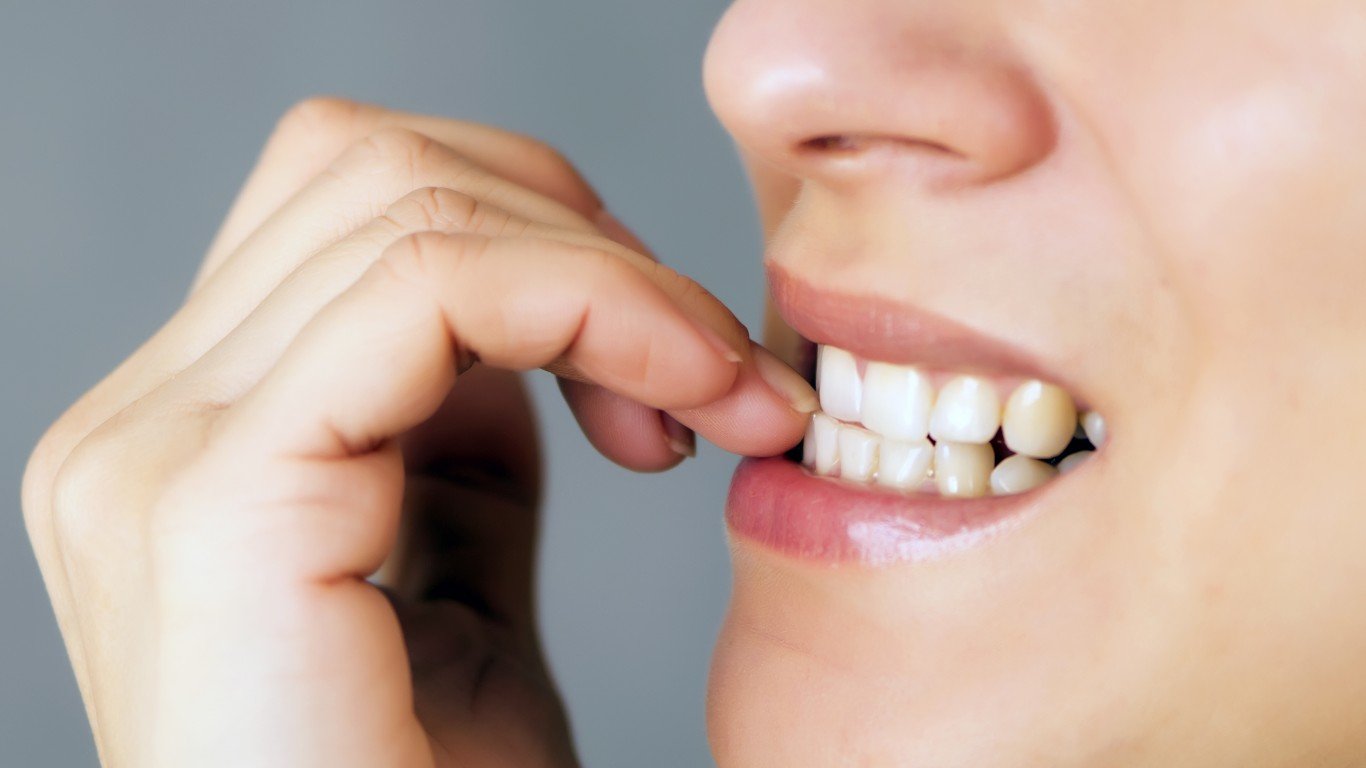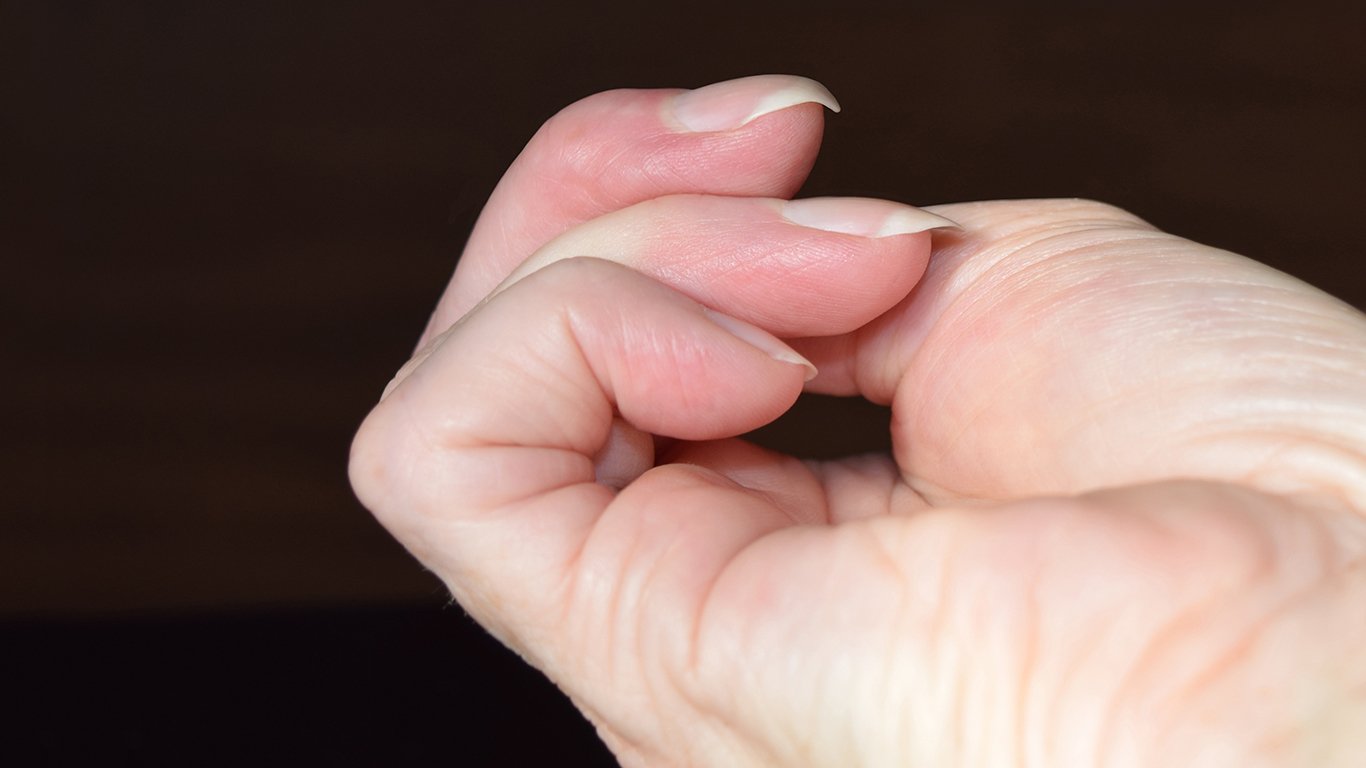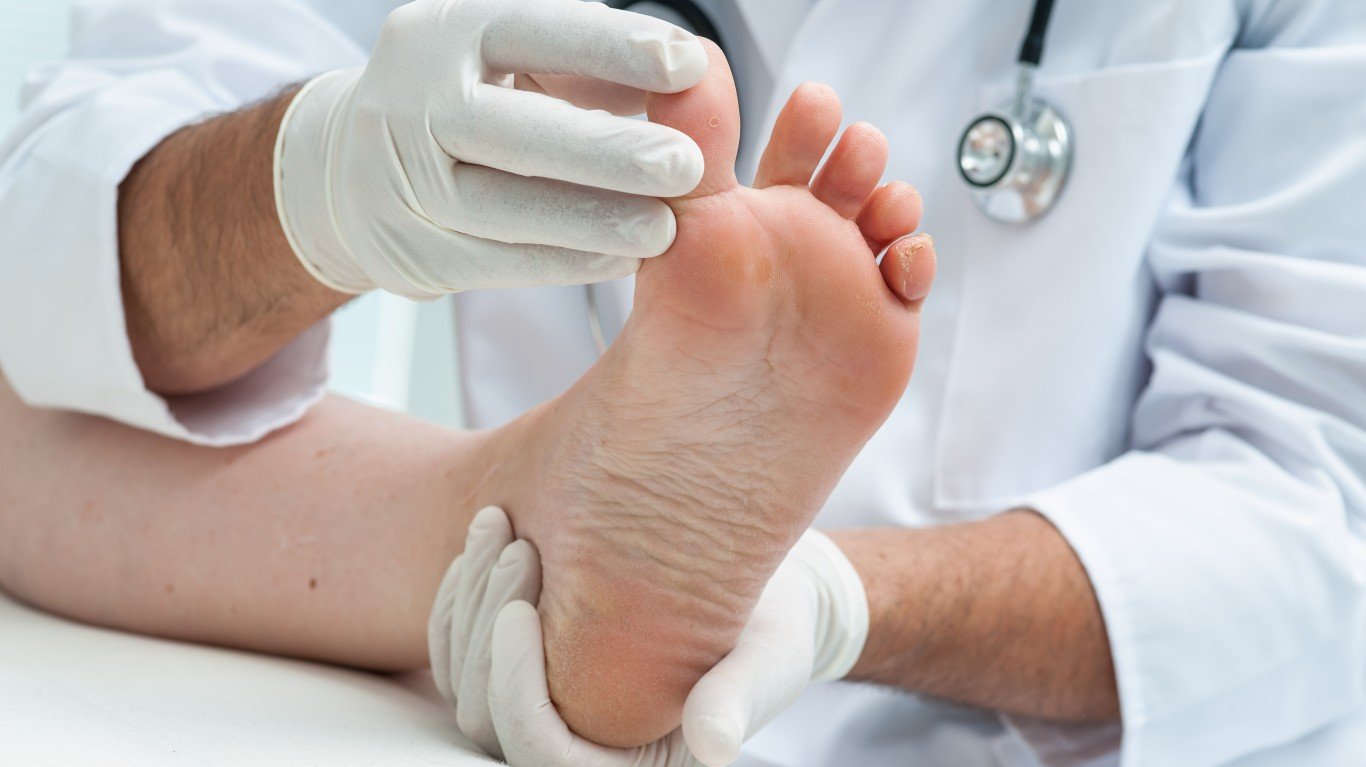

“Oh, it’s nothing.” “It’ll go away tomorrow.” How often have you said something like that when a seemingly minor pain or other health issue arises? In most cases, the bruise, cough, or sour stomach subsides in a day or two, and you’re back to feeling your old self again.
Yet, sometimes that cough or indigestion lingers, possibly for weeks. And that’s when it could signal a more serious health problem. A hallmark of ovarian cancer, for example, is persistent bloating and stomach upsets. Sadly, many women ignore those symptoms, thinking their condition is due to food poisoning or indigestion. By not reporting the symptoms sooner to their doctor, women risk delaying treatment for a deadly disease. Another symptom that should never be ignored, but women or men, is chest pain – which might signal acid reflux or a cardiac issue, both of which should be treated immediately.
Then there are symptoms characteristic of two diseases. Allergies often cause skin rashes. So does lupus, an autoimmune disorder. Difficulty sleeping can indicate diabetes, but it can also be a sign of sleep apnea – a condition in which the breathing passageway is blocked, making people wake up gasping for air – which is linked with cardiovascular disease. See these other examples of when a bad night’s sleep could be a symptom of health problems.
To create a list of 35 seemingly innocent symptoms that may be masking an underlying serious health problem, 24/7 Tempo reviewed scores of research papers and reviewed information from independent health organizations such as the National Institutes of Health, the American Cancer Society, and the National Kidney Foundation.
Click here to see seemingly innocent symptoms that could signal a serious health problem
So what constitutes a minor and temporary health problem and a more serious one? If the symptoms persist, see your doctor and tell him or her when the symptoms started, how long they last, and when they occur. In any case, don’t ignore these warning signs that you are in bad health.

Biting nails
> What you think it may be: Stress
> What it may actually be: Depression
According to the Cleveland Clinic, between 20% to 30% of Americans chew on their nails consistently. While you may think this is an innocent habit to relieve day-to-day stress, it could be a sign of deep-seeded anxiety and depression. That’s in addition to the damage you’re doing to your nails and fingers.
[in-text-ad]

Black lines on nails
> What you think it may be: Nutrient deficiency
> What it may actually be: Skin cancer
Black or brown lines on your fingernails, also known as melanonychia, appear as vertical strings from the bottom of the nail to the top. The lines occur when melanin or brown-colored pigment seeps into the nail beds. This phenomenon may be due to several factors, including pregnancy, lupus, or too much iron in your diet. One other possible explanation is skin cancer growing under the nail.

Bloating
> What you think it may be: Eating gassy foods
> What it may actually be: Ovarian cancer
After eating a meal of rich foods, you may feel bloated and a bit gassy. Although that’s normal in most cases as your body tries to absorb the food, persistent bloating in the abdomen and pelvis could be a sign of ovarian cancer. Loss of appetite and stomach pain also indicate ovarian cancer. Because women often mistake bloating for occasional stomach upsets, they may not tell their doctor about the symptom and delay diagnosis and treatment.

Bruises
> What you think it may be: Iron deficiency
> What it may actually be: Leukemia
A bruise appearing after you’ve fallen or hit an object is nothing to worry about. The bruise is your body’s way to healing. However, bruises that appear without any known cause could signal a blood cancer, leukemia. If the bruises are accompanied by fever, fatigue, and weight loss, you should visit a doctor.
[in-text-ad-2]

Canker sore
> What you think it may be: Stress
> What it may actually be: Celiac disease
Acidic and spicy foods can trigger canker sores, small, painful ulcers in the mouth. Certain medications such as Advil and Motrin can also cause canker sores. Adolescents and young adults under stress frequently develop canker sores – but so do people with autoimmune disorders, including celiac disease and lupus.

Changes in taste
> What you think it may be: Age-related
> What it may actually be: Kidney disease
At any age, you might eat something that leaves a bad taste in your mouth, such as garlic or spicy foods. As you grow older, your taste buds change and even less aggressive foods may have the same effect. But you should also be aware that people suffering from kidney disease sometimes report a metallic or ammonia taste in their mouth, or even “ammonia breath.” This is caused when the kidneys are unable to filter out urea from your body and flush it in your urine. When your kidneys aren’t working properly, the urea builds up and it may be expelled through your breath, at which point it reacts with your saliva and forms ammonia.
[in-text-ad]

Chest pain
> What you think it may be: Acid reflux
> What it may actually be: Angina
Chest pain can be sharp or dull, but it should never be ignored. When stomach acid comes up from the stomach to the throat, it can cause a burning sensation along the breastbone. Although acid reflux is a serious digestive disorder, it shouldn’t be confused with angina, a heart problem caused by a buildup of plaque in the arteries carrying blood to the heart. When the blood flow is blocked, you’ll experience chest pain, especially during physical activity.

Cloudy urine
> What you think it may be: Dehydration
> What it may actually be: Bladder stones
Normal urine is clear or light yellow in color. If you don’t drink enough water, your urine becomes more concentrated and cloudy. Another cause of cloudy urine, though, is the presence of kidney stones. Kidney stones form when the minerals and salts in your urine form crystals. Other symptoms of kidney stones are pain in the back or side, blood in the urine, and fever.

Cramping after walking
> What you think it may be: Dehydration
> What it may actually be: Peripheral artery disease
Exercising is good for you, but if you don’t stay hydrated, you could experience leg cramps. Leg cramps that stop after you’ve walked or exercised could also be a sign of peripheral artery disease (PAD), which is a narrowing of the arteries carrying blood to your legs.
[in-text-ad-2]

Difficulty sleeping
> What you think it may be: Anxiety
> What it may actually be: Diabetes or allergic rhinitis
We all have occasional sleepless nights when the stresses of the day keep us tossing and turning. But insomnia is also a hallmark of diabetes. When your insulin levels are high, your kidneys produce more urine, which makes you wake up and go to the bathroom – not very conducive to a good night’s sleep. People with Type 2 diabetes often also suffer from sleep apnea, an interruption in your breathing patterns as you sleep. In addition, one study found that people with allergic rhinitis from hay fever were twice as likely to have bouts of insomnia, particularly if their symptoms were severe.

Double vision
> What you think it may be: Tired eyes
> What it may actually be: Brain aneurysm
Staring at a computer all day will give anyone tired eyes that could make objects look blurry. Unfortunately, blurry or double vision can be a symptom of a brain aneurysm, a bulge in a blood vessel in the brain. If the blurry vision comes at the same time as a severe headache, it could mean the aneurysm has burst.
[in-text-ad]

Drinking too much coffee
> What you think it may be: Fatigue
> What it may actually be: Thyroid dysfunction
Located at the front of your neck, your thyroid produces hormones that control many of your bodily functions. If the gland makes too little of the hormones, you may have a condition known as hypothyroidism. One of the symptoms of hypothyroidism is extreme fatigue. So maybe your daily sleepiness isn’t because you aren’t getting enough sleep and need a stimulant like coffee to make it through the day. It could be due to a thyroid problem.

Dry mouth
> What you think it may be: Dehydration
> What it may actually be: Sjogren’s syndrome
We’ve all experienced dry mouth either from nervousness or not drinking enough water. Persistent dry mouth is also a characteristic of an autoimmune disorder called Sjogren’s syndrome. Often linked with dry eyes, Sjogren’s syndrome affects the mucous membranes and moisture-secreting glands of the eyes and mouth.

Facial puffiness
> What you think it may be: Eating too much salt
> What it may actually be: Tumor
Salty foods can be tasty, but often lead to temporary facial puffiness. Your kidneys maintain a proper ratio between sodium and water in your body. When you consume too much salt, your kidneys reserve more water to compensate, leading to swelling. Swelling of the face can also indicate a tumor in the lungs. A tumor in the lung blocks blood flow in a blood vessel known as the superior vena cava, the larger of two veins carrying blood back to the heart. As the blood flow is restricted, you may see puffiness in your face.
[in-text-ad-2]

Fits of anger over small things
> What you think it may be: Intermittent explosive disorder
> What it may actually be: Huntington’s
Intermittent explosive disorder is characterized by sudden outbursts sometimes over minor setbacks – but fits of anger can also characterize a rare inherited disorder, Huntington’s disease. The disease causes a breakdown of nerve cells in the brain, resulting in physical and psychological symptoms, including angry tantrums and lack of impulse control.

Foul breath
> What you think it may be: Bad oral hygiene
> What it may actually be: Liver disease
Brushing and flossing keep your teeth and breath fresh. But if you notice foul smelling breath even if you practice good oral hygiene, you may be having problems with your liver. Other symptoms of liver disease include swelling in the legs and ankles, abdominal pain, nausea, and fatigue. Liver disease can be caused by an infection such as hepatitis A, B, or C, which can cause what is called fetor hepaticus, chronic bad breath not caused by foods. The distinct feature of fetor hepaticus is a sulfur odor due to your liver not filtering out sulfur-containing compounds.
[in-text-ad]

Headaches
> What you think it may be: Dehydration
> What it may actually be: Carbon monoxide poisoning
Dehydration leaves feeling thirsty, dizzy, and headachy because your body isn’t getting enough fluids, and resting and drinking water will generally ease the problem. But that headache could also mean you’re suffering from carbon monoxide poisoning from a buildup of the gas in an enclosed space. When CO pools in your blood, your body replaces the oxygen in red blood cells with the carbon monoxide. This can damage your tissues and cause symptoms like a dull headache, dizziness, weakness, confusion and blurred vision. Install a CO detector in your home to prevent poisoning.

Constant hunger
> What you think it may be: Lack of sleep
> What it may actually be: Diabetes
After a sleepless night you’re probably feeling hungry, and in the short term, a meal may fuel a burst of energy. But if you’re constantly hungry (and thirsty) you may have diabetes, a condition in which your body makes either too much or too little insulin.

Laryngitis
> What you think it may be: Hoarseness
> What it may actually be: Laryngeal cancer
A scratchy throat is a sign of laryngitis, a temporary irritation of the larynx. But if the hoarseness lasts more than two weeks, it could be a sign of laryngeal cancer, or cancer of the voice box in the throat.
[in-text-ad-2]

Loss of smell
> What you think it may be: COVID-19
> What it may actually be: Alzheimer’s and Parkinson’s disease
Loss of small, or anosmia, has been linked with long COVID-19, a condition where people who have recovered initially from the virus still have debilitating symptoms. Yet anosmia is also a characteristic of Alzheimer’s and Parkinson’s disease. Why loss of smell is often associated with Parkinson’s disease is unclear, but one theory is that the condition starts in the olfactory bulb, the part of the brain that controls the sense of smell.

Neck pain
> What you think it may be: Spasms or a strain
> What it may actually be: Meningitis
We’ve all slept the wrong way and woken up with a stiff neck or neck spasms. But neck pain is one of the symptoms of meningitis, an inflammation of the fluid and membranes around the brain or spinal cord. Most often caused by a virus, meningitis also causes high fever, seizures, and brain fog.
[in-text-ad]

Night sweats
> What you think it may be: Anxiety
> What it may actually be: Non-Hodgkin’s lymphoma
We tend to sweat when we’re nervous. If anxiety is keeping you up at night, you could wake up soaked in sweat. Night sweats may also be caused by non-Hodgkin’s lymphoma, a type of cancer in the lymphatic system. In this cancer, white blood cells multiply and may form tumors that spread throughout the body.

Persistent cough
> What you think it may be: A cold
> What it may actually be: Chronic obstructive pulmonary disease
Coughing and wheezing usually come along with a nasty cold. But a persistent cough indicates chronic obstructive pulmonary disease, too. Emphysema and chronic bronchitis are most often linked to COPD, which is an inflammation of the lungs leading to difficulty breathing.

Scratching
> What you think it may be: Dry skin
> What it may actually be: Celiac disease
An autoimmune disorder, celiac disease renders sufferers unable to digest gluten, a protein found in wheat, rye, and barley. As a digestive illness, it causes abdominal pain, bloating gas, and other stomach upsets. Another characteristic of the disease is dry, itchy skin that sometimes breaks out into blisters. Left untreated, celiac disease robs your skin of nutrients needed to keep it healthy.
[in-text-ad-2]

Sharp pain in your sides
> What you think it may be: UTI
> What it may actually be: Kidney infection
A urinary tract infection typically begins in the bladder and urethra. If it’s not treated, it may travel to the kidneys, where it can damage the organs. UTI and kidney infections present similar symptoms, notably pain in the side.

Skin color changes
> What you think it may be: Allergy
> What it may actually be: Liver disease
When your body reacts negatively to a substance, skin rashes and hives sometimes develop. In response to the “invaders,” your immune system releases too many antibodies, which can cause skin rashes. Your skin may change color as well if you have liver disease. Specifically, your skin and eyes may appear yellowish as your liver fails to filter out bilirubin, a blood waste product.
[in-text-ad]

Skin rash
> What you think it may be: Allergy
> What it may actually be: Lupus
Our immune system keeps us safe from foreign substances with antibodies that attack the harmful agents. Unfortunately, our immune system sometimes sends out antibodies against substances that aren’t bad, resulting in allergic rashes and other symptoms. Similarly, lupus is an autoimmune disease in which the immune system targets tissues and organs. One sign of lupus is a rash spreading across both cheeks.

Slow-growing toenails
> What you think it may be: Age-related
> What it may actually be: Peripheral artery disease
Think your toenails aren’t growing because of age? Think again. Peripheral artery disease blocks blood flow to your legs and feet. Without blood flowing to your toes, your toenails aren’t getting the nutrients needed to grow.

Snoring
> What you think it may be: Throat problems
> What it may actually be: Heart disease and/or sleep apnea
According to Johns Hopkins, 45% of adults snore occasionally, while 25% snore regularly. Although snoring may be a nuisance to most people (and their partners), it can also be a sign of a serious health disorder. Loud snoring is associated with sleep apnea, a condition that causes breathing to pause during the night. Sufferers may wake, gasping for air. Sleep apnea is a risk factor for cardiovascular disease, as well.
[in-text-ad-2]

Stomach pain
> What you think it may be: Indigestion
> What it may actually be: Heart attack in women
Heart attack symptoms differ between men and women. While both may experience chest pain, women often complain of a feeling of tightness in the neck, jaw, shoulder, and upper abdomen. Another symptom of a heart attack in women is heartburn or indigestion.

Swollen fingers
> What you think it may be: Eating too much salt
> What it may actually be: Kidney disease
We’ve all eaten too much salty food and ended up with swollen fingers. But if you notice persistent swelling in your limbs, you may be suffering from kidney disease. Kidney disease impairs renal function so your kidney cannot filter out fluids and other waste products from your body, leading to swelling, fatigue, loss of appetite, and muscle cramps.
[in-text-ad]

Swollen toe
> What you think it may be: Stubbing
> What it may actually be: Gout
Few things are more painful than a stubbed toe – but if you notice a swollen toe without any injury, you could be suffering from gout. A form of arthritis, gout is caused by a buildup of uric acid in the body. The uric acid forms into crystals that lodge in the joints, particularly the big toe. Eating too much food with purines (organ meats, red meats, seafood) can lead to gout.

There’s something in your eye
> What you think it may be: Pink eye
> What it may actually be: Retinal detachment
Pink eye, or conjunctivitis, can be the result of an infection, allergy, or an irritant in the eye. You may feel like there is something in your eye you can’t dislodge. Yet it can also mean the retina at the back of your eye has become detached. You may not feel any pain, but you may experience blurred vision, flashes of light, or “floaters,” tiny specks drifting into your sight. A retinal detachment requires immediate medical attention.

Waking up at night
> What you think it may be: Too much caffeine
> What it may actually be: Sleep apnea
Drinking a cup of joe before bedtime isn’t recommended, as caffeine can keep you awake. But so can sleep apnea. The most common form of sleep apnea, obstructive sleep apnea, occurs when the muscles in the back of your throat relax and narrow your breathing pathway. As the air is blocked, you wake up and gasp for air.
[in-text-ad-2]

Wheezing
> What you think it may be: Allergies
> What it may actually be: Reflux disease
Nasal allergies are known for blocking your breathing, making you wheeze for air. People suffering from reflux disease, or gastroesophageal reflux disease, often complain of breathing problems. GERD causes acids typically contained in the stomach to seep up into the esophagus and irritate its lining. The irritation causes asthma (if you didn’t have it already) and its accompanying wheezing as well as laryngitis.
Take This Retirement Quiz To Get Matched With An Advisor Now (Sponsored)
Are you ready for retirement? Planning for retirement can be overwhelming, that’s why it could be a good idea to speak to a fiduciary financial advisor about your goals today.
Start by taking this retirement quiz right here from SmartAsset that will match you with up to 3 financial advisors that serve your area and beyond in 5 minutes. Smart Asset is now matching over 50,000 people a month.
Click here now to get started.
Thank you for reading! Have some feedback for us?
Contact the 24/7 Wall St. editorial team.
 24/7 Wall St.
24/7 Wall St.


